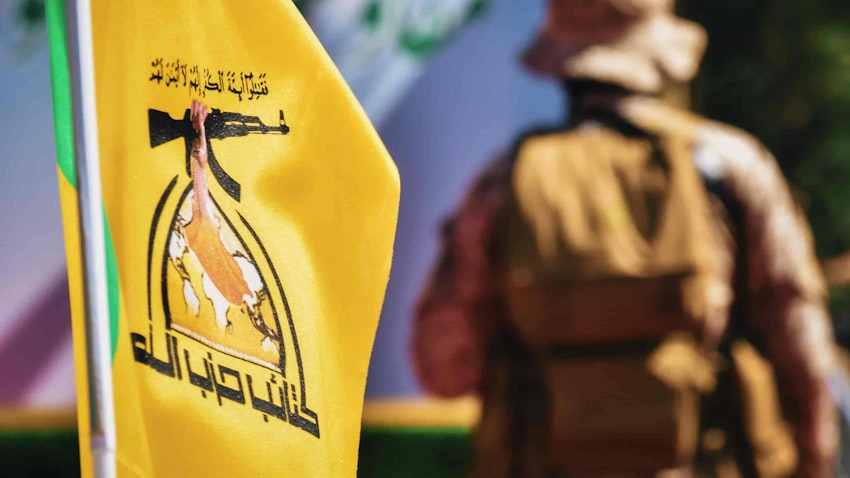Alwaght- On Saturday evening and hours after start of talks between Iran and the US in Oman, about 3,000 kilometers away in Baghdad, BBC reporter said that now that Tehran and Washington are engaged in talks, some parties in Iraq are talking about disarming the resistance forces and the Popular Mobilization Forces (PMF), a force formed in Iraq in opposition to ISIS terrorist group in 2014.
This was not the first time that Western media raised the issue of disarming resistance groups in the region, including in Iraq. Almost since the formation of resistance groups in Iraq, Lebanon, and Yemen, Westerners and actors close to them in West Asia have repeatedly emphasized the disarmament of resistance groups, and this issue has been heard more often over the past year and after Gaza war. In Iraq, however, it seems that the government and resistance groups are seeking to manage the pressures against disarmament.
PMF bill set for finalization
Three days ago, PMF commander Faleh al-Fayyadh highlighted the significance of the role of the PMF in victory over ISIS and talked about start of a new phase in the course of transformation of this institution into an official and structural organization in a ceremony honoring graduates of a military academy. Referring to a bill related to the PMF, he said that with finalization of the bill, an important stap will be taken in redefining the position of the PMF within the framework of the Iraqi armed forces. Al-Fayyad also announced that the law foresees the establishment of a special military academy for the voluntary force. Iraq needs strong and law-abiding defense structures to overcome challenges and protect its reconstruction path, he added.
The bill; in favor or against the PMF?
Despite al-Fayyadh’s announcement of the approval of the PMF-related draft bill in Iraq, no specific text or statement about this bill has yet been published in the media, but it seems that the resistance leaders are trying to manage external and internal pressures on the PMF in order to protect this military organization in Iraq. From this perspective, it can be said that the approval of this law with the aim of transforming this group into an official and structured organization is a positive step towards neutralizing the pressures against this resistance group in Iraq.
Even more importantly, the head of the PMF emphasized in his statements that this law foresees the establishment of a special military academy, and the establishment of this military academy could in practice transform the PMF from an armed group into a more powerful military and security institution in the Iraqi political scene. From this perspective, it can be said that the approval of the law is expected to lead to the promotion of the force in political competitions and the internal military structure.
Why is Iraqi government moving to new PMF law?
Apart from the external and internal pressures over the government to disarm the resistance groups under the PMF, the Iraqi government itself is uninterested to engage in the US tensions and pressures against Iran. In other words, Baghdad is trying to control the Western and American pressures with a law legalizing the PMF as an official armed force in Iraq.
On the other hand, Iraq continues to face terrorist threats. After the fall of Bashar al-Assad's government, armed rebel groups have taken over the power in Syria, and Iraq's borders are potentially facing terrorist threats. Therefore, the Iraqi government, in the face of terrorist threats at home and abroad, cannot and is not able to disband or disarm the main anti-ISIS armed group. In other words, it can be said that disarming the PMF is a green light for terrorist groups to infiltrate Iraq, especially from the Syrian borders. Therefore, it seems that the Iraqi government is trying to protect the PMF from external pressures and the law is aimed at linking the PMF to the regular army and the security forces.
The risk of full dissolution of the PMF
Another issue about the PMF is that its dissolution bears serious security consequences for Iraqi existence. Even former governments under Haider al-Abadi from 2014 to 2018 and Mustafa al-Kadhimi from 2020 to 2022 could not dissolve or disperse the PMF because they were aware of the consequences despite the US pressures.
Citing a report from the Prime Minister Mohammad Shia al-Sudani government sources, Iram News reported that only 40 percent of the PMF may agree to its dissolution, and the vast majority of these forces will strongly resist any decision by the Baghdad government to weaken the group. Political expert Salem al-Saffar said in a report said that the armed factions in Iraq, especially those associated with political programs, consider weapons to be part of their power and influence, and the PMF are also part of the Iraqi security system by law, and in these conditions they will not accept their dissolution by any means, although they may agree to integrate into the army on the condition that the commanders of the brigades and ranks maintain relative independence. According to al-Saffar, what could convince the PMF to integrate is that the new law does not marginalize the group politically.
The reality is that over 10 armed factions are within the PMF structure, with close bonds to other resistance groups in the region. These factions include Kataib Hezbollah, Nujaba, Asaib Ahl Al-Haq, Badr, and others. These groups are not ready to lay down arms against common enemies like Israel and the US.
Political officials in Baghdad are well aware of consequences of firing over 220,000 PMF forces and stripping them of their rights. They know that dissolution or impairment of the PMF can produce security disruption and armed clashes. So, instead of terminating the PMF role, it seems that the Iraqi government is seeking to manage the pressures to maintain the PMF beside the country's other armed forces.



























